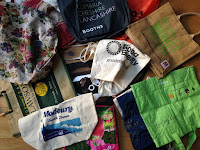From today: the new 5p tax will be charged for single-use plastic shopping bags
The long-debated tax of 5 pence per single-use plastic bag becomes law from the 5th October in England, and applies to ‘free’ bags from larger shops and chains (enterprises employing more than 250 people). Smaller shops can also charge if they wish. The sums charged go into pots for charity…so there are some complex processes, rules, exceptions (and fines for non-compliance) behind the scenes.
Read the government’s guidance for retailers here.
So what?
In 2013 we used 8 billion of these ‘free’ bags per year, just from UK supermarkets….with year-on-year totals growing.
Wales, Northern Ireland and Scotland have already implemented this tax – the latest figures show that in Wales, the use of these short-life bags nationally has been reduced by 79% over 4 years.
The majority of these bags are instant waste, with an enormous cumulative impact in terms of costs of dealing with household and business rubbish, and blight from windswept litter all around us.
Read TTT’s earlier 2010 post about global plastic pollution here.
They are derived from oil, a non-renewable resource. (There are other options such as bidoegradeable cornstarch).
Of course there is a carbon saving if bag use is reduced – savings in terms of materials used to make them, and their distribution, and the carbon costs of disposing of them.
‘Reduce’ has much more positive impact than ‘re-use’ or ‘recycle’ and is much more within our own control.
What does this mean for me?
There’s a new article – click here – which summarises exactly that.
 |
| Which shopping bag to use today? |
There’s an easy option that can suit all pockets:
use a textile ‘bag for life‘.
Made of jute or cotton, they are recyclable when they finally pack up – cut up and composted, or used as mulch.
For a good short article about re-usable bags, click here.
Cloth bags also have a carbon cost in their own production and distribution; some long-life shopping bags are made of plastic textiles.
We can make a positive statement
Eagle-eyed readers will see a cloth shopping bag from Modbury, Devon in the photo above. That same image is used on the ‘Welcome to Modbury’ road signs outside the town.
There, a local voluntary campaign in 2007 encouraged shops and shoppers in the town to stop using plastic bags.
That brought a double win – not only reducing oil-derived waste, but also developing social glue and a sense of teamworking in the community. That is not necessarily easy: Rebecca Hosking who championed this idea in Modbury said in 2007:
- “It seems to have really brought people together. The shops have sent all their unused plastic bags to Newcastle where they are being made into plastic chairs, and they have all set up plastic bag amnesty points where people can bring in the hundreds of bags that they keep under the kitchen sink. Now it’s just a question of seeing if people accept it. We are all trembling now. To be a pioneer is pretty scary.”
And in Tooting?
Now, 8 years after this pioneering in Modbury, larger enterprises all over in England will be charging for single-use bags from today.
- What can we do locally to build on this opportunity to make a positive statement about Tooting and its environment?
- How can we encourage small retailers to reduce bag use?
- Can we make upcycled Tooting bags with charity shop textiles?
- Grow our own shopping bags? …any more ideas?
 |
| Fashionable on eBay, but still plastic |

